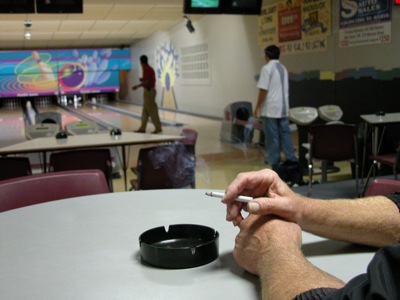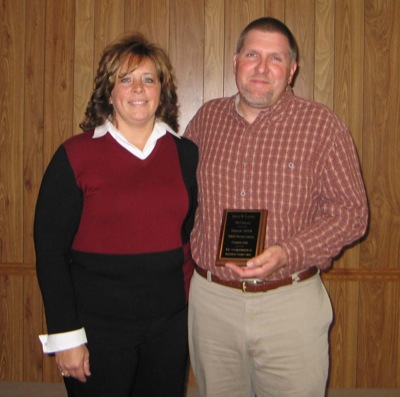Wednesday, November 15th, 2006
Waiting for the smoke to clear
By Shelley Grieshop

Photo by Shelley Grieshop/The Daily Standard
In less than two weeks smoking will be prohibited in all public places like bowling alleys, bars and restaurants following the passage of a statewide smoking ban on Election Day. Area business owners, smokers and the officials who must enforce the law say many details of the law have yet to be worked out.
It's difficult to tell who's more confused these days: smokers, business owners or health officials.
In 22 days, a law passed last week by Ohio voters will ban smoking in nearly every public place across the state. But just how it will work remains up in the air like the rolling smoke it's meant to remove.
"I'm not sure," was the common reply to questions asked of Jay Carey, director of public affairs for the Ohio Department of Health, the agency placed in the driver's seat of the new law that goes into effect Dec. 7.
Carey says it's too early to say how enforcement and funding issues will work. The Ohio Department of Health has until June 7 to adopt rules of implementation that, hopefully, will clear up many misconceptions.
Chuck Behm of Celina says he thought the police would be used to arrest violators. But in reality, the smoking ban is a civil matter not a criminal one, and unless confrontations get heated, law enforcement will not be used to enforce it.
Behm, a longtime smoker, believes many people will disregard the law. He still can't believe it passed.
"It makes me suspicious of the (election) results," he said.
Ron Cisco, owner of the Plaza Bowling Lanes in Celina, hoped Smoke Less, a less restrictive smoking campaign, would be victorious.
"I think most people misunderstood the issue and thought smoking would still be allowed in places like this," Cisco says. "I'm just not sure how this is going to work or affect my business."
Surveys available online that were conducted in U.S. cities that have already gone smoke-free, appear to have unreliable findings. Some show an unexpected increase in sales while others reveal a record number of business closings. Because factors such as the local economy can shift the success of small businesses, it's difficult to accurately judge the effects of smoking bans, officials say.
Mercer and Auglaize County health officials say they won't be going on patrol to find violators. Instead they will investigate complaints when contacted. However, hospitality businesses are busiest during the weekends when health officials are off the clock.
A first-time violator of the new law will net a warning with subsequent violations costing $100 to $2,500 - the higher amounts awarded to repeat offenders. Business owners can be cited for allowing smoking in their establishments. Smokers, too, will pay up if they refuse to extinguish their cigarettes when asked, officials says.
"The law has to have teeth. We have to be able to fine people, although it's not something we're used to doing," says Auglaize County Health Commissioner Charlotte Parsons. "I hope we won't be holding a 'smoker's court.' "
The specifics of the law, yet to be written, will address who issues the citations and collects the fines, state officials told The Daily Standard.
Cisco says he's not keen on the role of "enforcer," but he doesn't want to risk getting fined either. Estimating that more than 50 percent of his clientele smoke, he's glad leagues started before the law passed or bowlers may have opted to play elsewhere. Smoking is allowed in bowling alleys in nearby Indiana.
Cisco, a nonsmoker, says he's been exposed to second-hand smoke since he began operating the local bowling alley 40 years ago. He's read about the dangers of second-hand smoke but worries more about making ends meet.
"It's crossed my mind, but I live with it, this is my livelihood. Besides, people are more courteous these days. Most don't let their smoke roll in your face," he says.
Some business owners like Shirley Hilderbrand of Shirley's Bar & Grill in Montezuma still are contemplating a way around the law. As an owner, Hilderbrand was hoping to qualify under the "private club" exemption, however, it stipulates a business cannot have any employees and must be a not-for-profit entity.
"It's a stupid law, and I think we should be allowed to make our own decisions," she says. "It's unconstitutional and it's taking our rights away. First seat belts, now this. What's next?"
An exemption for family-owned businesses may have given hope to some area businesses. But the law stipulates that all their employees must be related to the owner, the enclosed areas on site cannot be open to the public and the building itself cannot be connected to any other public structures where smoke might travel.
Health officials, who have backed the issue from the start, now are wondering aloud how they will find time and money to handle complaints and issue citations if state officials place the entire job in their laps. Beginning next year, local health departments also must enforce the new and complicated sewage system rules and detailed school inspections.
Ohio now joins 15 other states which have adopted smoking bans and smoking restrictions statewide. Some states have less restrictive rules but backers of the Ohio ban say the new law was designed to protect its citizens to the fullest.
"We didn't want to pick and choose which employees and customers should be free of second-hand smoke," says Wendy Simpkins, spokeswoman for the American Cancer Society, the lead agency supporting the law.
Delaying portions of the law as some states have done or allowing a longer list of exceptions only confuses people, Simpkins explains.
As the days of public smoking disappear, Behm wonders just how far the issue will go.
"I'm afraid that one of these days a law will be passed saying I can't smoke in my own house. You know, there's a lot bigger problems out there than this," he says.


